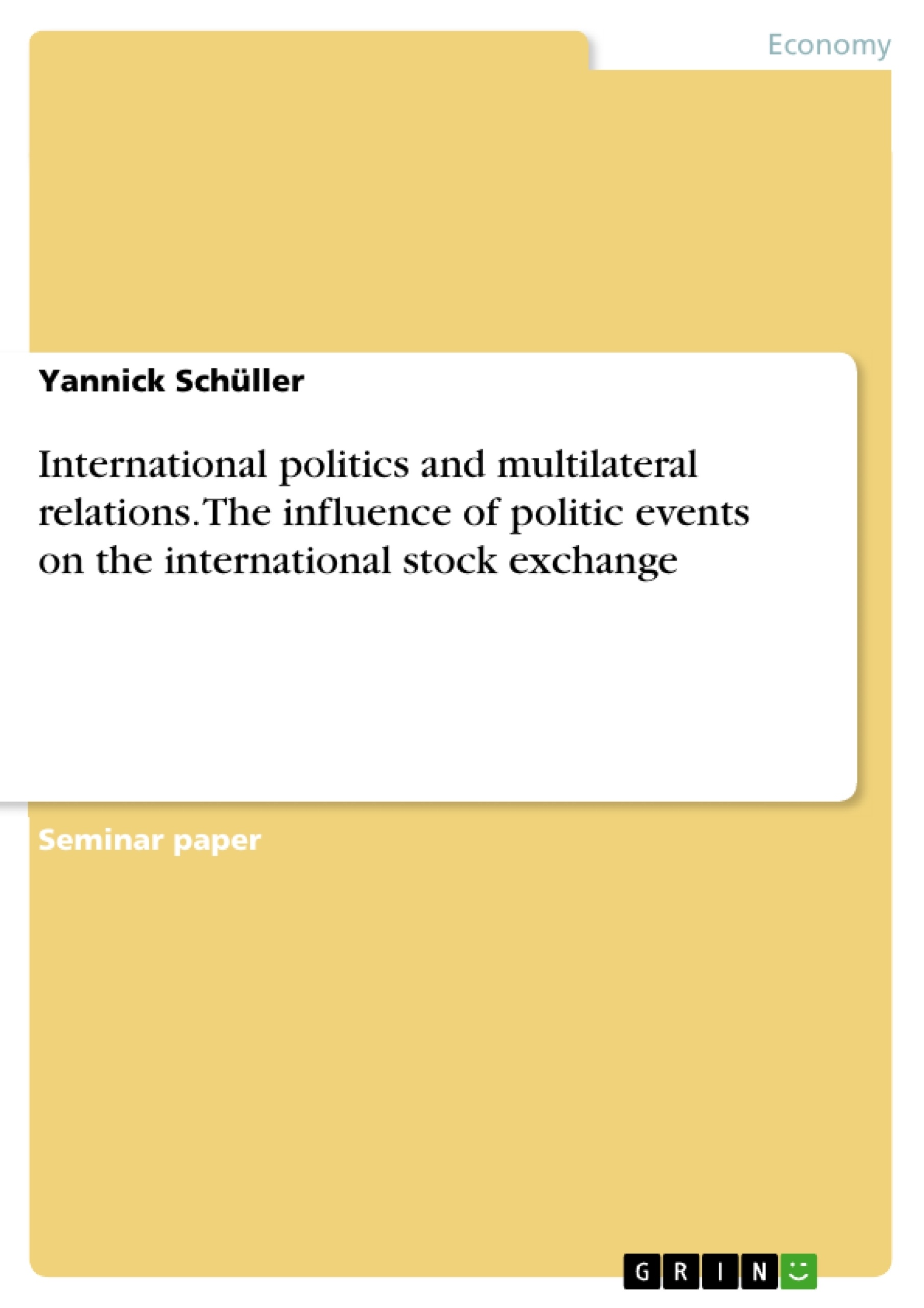The aim of this term paper is, to find out which influence political events have on the international stock market. To clarify this question, first of all the basic concepts of the stock market and international politics are explained. Based on these fundamentals, the approach of the realistic theory of Hans Morgenthau is considered. In addition, direct and indirect influences of politics are presented and discussed.
The following explains the basic principle of the stock market and various products with their specific characteristics. Subsequently, the effects of direct influences on and the effects of indirect influences on the stock market are examined. Practical examples show what investor behavior can be observed and whether one can recognize recurrent patterns of behavior for particular types of events.
Not only events, like elections and referendums have indirect influence on the world wide stock exchange. Even daily news of sudden crises and wars around the world can change the behavior of investors massively. On the other side, political decisions, that are announced for a long time, like sanctions, subsidies and punitive tariffs, can lead to unexpected courses on the stock exchange, too. Investors and traders around the world have to handle these sudden movements carefully to not lose a lot of money, or better, to make profit. But different events have different results. And depending on where the traders are in the market, they behave different.
Table of Contents
- Introduction
- Problem setting
- Objective
- Conceptual foundation
- International policy
- Stock exchange
- Trade Policy
- Approach to Hans J. Morgenthau
- Direct influences in the world economy
- Sanctions
- Subsidies
- Indirect influences on the world economy
- Referendums
- Wars
- Attacks
- Force majeure
- Stock Exchange
- Supply & demand
- Investment products
- Investor behavior in practice
- Reaction to direct economic influences
- Reaction to indirect economic influences
- Conclusion
Objectives and Key Themes
This paper aims to explore the complex relationship between international political events and their impact on the international stock exchange. It delves into the conceptual foundation of international policy and stock exchange dynamics, analyzing how trade policy influences the world economy. The paper examines both direct and indirect influences on the global market, including sanctions, subsidies, referendums, wars, attacks, and force majeure events.
- International politics and its impact on the stock exchange
- Trade policy and its influence on the global economy
- Direct and indirect economic influences on investor behavior
- The interplay of supply and demand in the stock market
- Investor behavior in response to political and economic events
Chapter Summaries
- Introduction: This chapter sets the stage by defining the problem setting and outlining the paper's objectives.
- Conceptual foundation: This chapter provides a foundation for understanding the paper's central concepts, explaining the basics of international policy and the functioning of the stock exchange.
- Trade Policy: This chapter dives into the specific mechanisms through which trade policy impacts the global economy. It examines both direct influences, such as sanctions and subsidies, and indirect influences, including referendums, wars, attacks, and force majeure events.
- Stock Exchange: This chapter explores the stock exchange itself, focusing on the principles of supply and demand and the various investment products available.
- Investor behavior in practice: This chapter examines how investors react to both direct and indirect economic influences, providing insights into real-world investor behavior.
Keywords
The paper centers around key themes of international politics, trade policy, stock exchange dynamics, investor behavior, and economic influences. It analyzes the impact of global events on financial markets, emphasizing concepts like sanctions, subsidies, referendums, wars, attacks, force majeure, supply and demand, and investment products. The study aims to understand the intricate relationship between political events and the international stock exchange, highlighting the dynamic interplay between these forces.
Frequently Asked Questions
How do political events influence the stock market?
Political events influence markets through direct measures like sanctions and subsidies, or indirectly through wars, elections, and referendums that change investor confidence.
What is Hans Morgenthau's realistic theory in this context?
The paper uses Morgenthau's realism to explain how states pursue their interests in international policy and how this power struggle impacts global trade and markets.
What are examples of indirect political influences?
Indirect influences include wars, terrorist attacks, referendums (like Brexit), and 'force majeure' events that cause sudden market volatility.
Can political decisions lead to unexpected stock movements?
Yes, even long-announced decisions like punitive tariffs or subsidies can result in unexpected market reactions as investors adjust their strategies and handle risk.
How do investors typically behave during a crisis?
Investor behavior often follows recurrent patterns, such as a 'flight to safety' during wars or massive sell-offs during sudden political instability.
- Quote paper
- Yannick Schüller (Author), 2018, International politics and multilateral relations. The influence of politic events on the international stock exchange, Munich, GRIN Verlag, https://www.grin.com/document/497055



